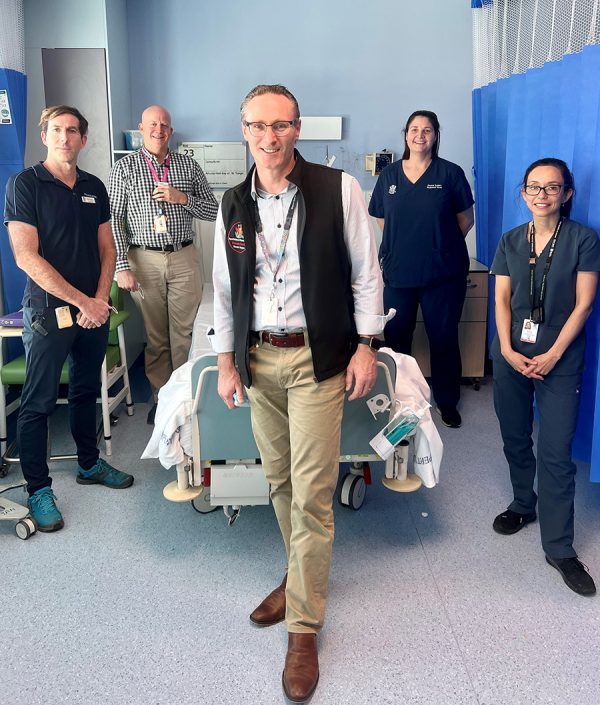RBWH commences Multimodal Rib Fracture Service
The new Multimodal Rib Fracture Management Service at the Royal Brisbane and Women’s Hospital (RBWH) is seeing a significant reduction in length of hospital stays and better outcomes for this patient cohort.

The RBWH Multimodal Rib Fracture Service team, from left to right: Andrew Statham, Physiotherapist, Michael Handy, Assistant Nursing Director, Trauma Service, Professor Martin Wullschleger, Director of Trauma, Michelle Ross, Registered Nurse, Isadora de la Cruz, Trauma Registrar
Rib fractures are one of the most common injuries in trauma patients admitted to the Royal Brisbane and Women’s Hospital, with the management of severe chest injuries with multiple displaced rib fractures presenting a particular challenge to treating teams.
In October 2020, a multimodal team consisting of staff from the Emergency and Trauma Centre, Acute and Subacute Pain Service, Trauma Service, Acute Surgical Unit, Thoracic Surgical Unit, Physiotherapy and Nursing developed a new rib fracture management service with clear treatment algorithms for pain management, physiotherapy and surgical stabilisation of rib fractures.
The service involves treating moderate and severe rib fractures using a range of pain management tools, chest physiotherapy, general care with mobilisation and good nutrition to support the patient’s recovery. A pathway to operative stabilisation/fixation of rib fractures for severe cases where ribs are displaced and broken in several spots has also been established.
Early data comparing three years prior to implementation of the service to the past 12 months shows a three-day reduction in length of hospital stay for rib fracture patients.
RBWH Trauma Service Director Professor Martin Wullschleger said the service was developed to ensure all rib fracture patients received optimal contemporary treatments as quickly as possible.
“The feedback we have received from both patients and staff has been incredibly positive,” Professor Wullschleger said.
“While more research is required to expand on the preliminary research, we are very happy with the success of the service and our findings to date.
“We hope to continue improving and expanding on the service and its modalities in the future and are in the process of developing educational tools and simulation material to further support the initiative.”
